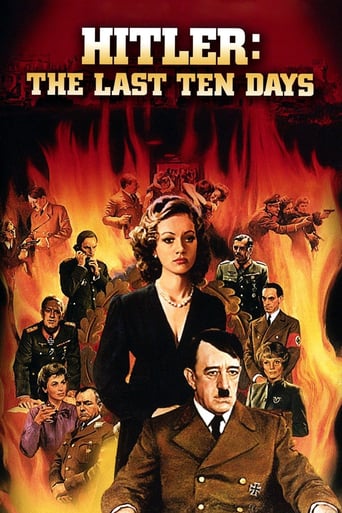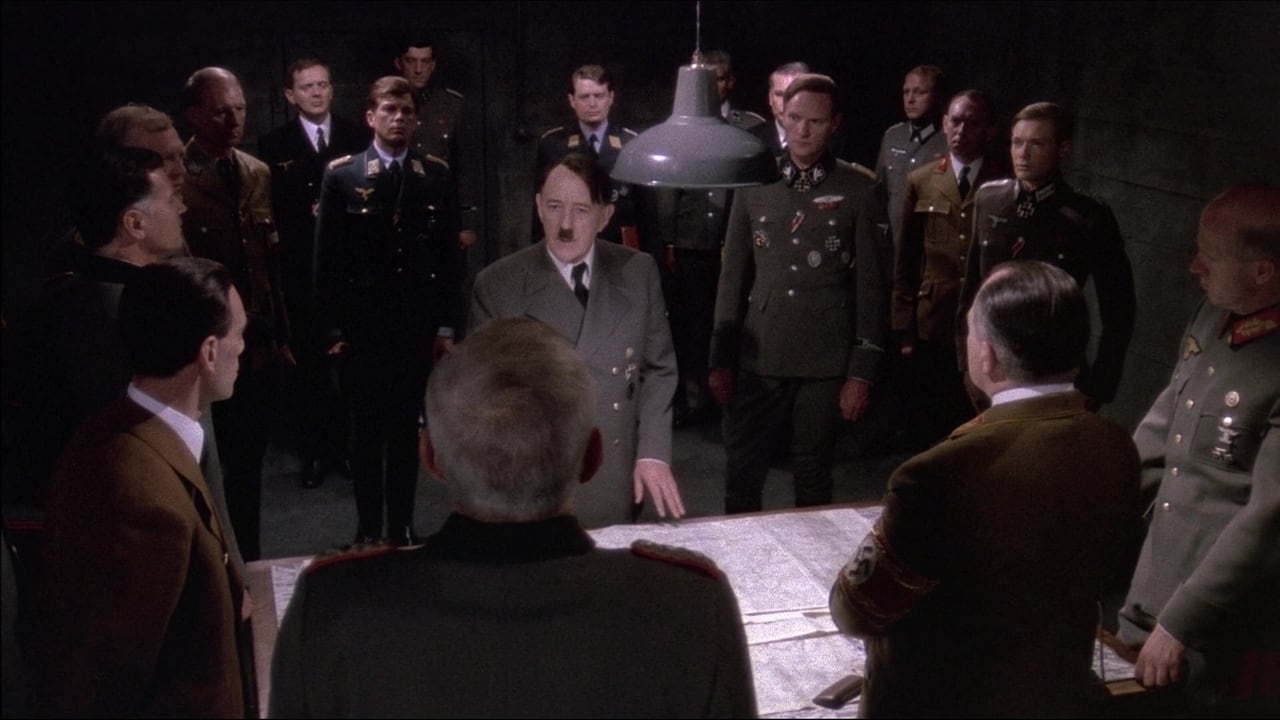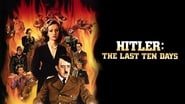SnoopyStyle
This starts with a recap of the Nazi rise to power. The opening credits roll as German forces roll through a map and then they retreat back towards Berlin. It's April 20, 1945 and the Russians are closing in on his Berlin bunker. It's the 56th birthday of Adolf Hitler (Alec Guinness) and ten days before he commits suicide. It's a delusional place where Hitler directs non-existent and depleted forces. There is an air of unreality. After Hitler's death, the remaining personnel light up their cigarettes which was forbidden during his life. It's purported to be based on eye-witness accounts of the true events. Guinness brings his legendary acting prowess to the character. It's not the most thrilling story especially since the ending is inevitable. It's a methodical telling. It is the performance that holds it all together.
JasparLamarCrabb
Not particularly cinematic but still fairly arresting thanks to Alec Guinness's riveting performance in the title role. Guinness's interpretation of Hitler portrays him as both a doddering old coot AND a paranoid lunatic. He's pretty scary. Director Ennio de Concini juxtaposes the outré goings on in Hitler's bunker with newsreel footage of Germany's decimation at the hands of allied forces. The dialog is at times comical (Hitler discussing the obesity problem of German music stars) and at times creepy (Hitler ordering the flooding of German subway tunnels being used as a make-shift hospital by injured German soldiers). Guinness is great and is supported by many fine character actors including Adolfo Celi, Simon Ward and Eric Porter. Doris Kunstmann makes an appropriately bourgeois Eva Braun and, in a cameo, Diana Cilento plays a resourceful flying ace. The chilling music score is by Mischa Spoliansky.
GulyJimson
How does one approach the towering figure of Adolf Hitler, a figure so out-sized in his cruelty, so colossal in his infamy, that it staggers the imagination to conceive that he actually lived and breathed? Yet he was as human as you and I and gifted with some of the virtues and most of the flaws that flesh is heir to. One could examine him from a historical, psychological, or sociological perspective. Taking a position on Hitler's moral character is not difficult; he was the embodiment of evil. But did he have greatness, as well? His nemesis, Winston Churchill offered this assessment, "If evil can be great, we cannot deny him greatness." He certainly had genius. Not as a painter as he probably wished. His genius lay elsewhere. He was probably the greatest actor of the twentieth-century who used first Germany and then the World as his stage, mesmerizing it with performances of such messianic passion that he transported his audiences away with him to some unattainable inner Valhalla of their own making. Watching one of his performances-I call his speeches performances-because it was not what he said, but how he said it that was extraordinary, one is immediately struck by how well thought out and structured they were, with every gesture and movement of the body orchestrated to give meaning to the the torrent of words pouring forth.Hitler has been well served in cinema. As an enthusiastic cineaste and certifiable egomaniac, he probably would not have been pleased by the portrayals. He likely would have viewed himself as a tragic hero, or worse a misunderstood martyr. He would never have understood that his crimes were too heinous and numerous for cinema to depict him in that light. Some notable interpretations of Der Fuhrer have been, Charles Chaplin, "The Great Dictator" (1940) Ludwig Donath, "The Strange Death of Adolf Hitler" (1943) Luther Adler, "The Desert Fox" (1951) Albin Skoda, "The Last Ten Days" (1955) Richard Basehart, "Hitler" (1962) Billy Frick, "Is Paris Burning?" (1966) Frank Finlay, "The Death of Adolf Hitler" (1973) Alec Guinness, "Hitler: The Last Ten Days" (1973) Ian Bannen, "The Gathering Storm" (1974) Anthony Hopkins, "The Bunker" (1981) Derek Jacobi, "Inside The Third Reich" (1982) Norman Rodway, "The Empty Mirror" (1996) Noah Taylor as a young Hitler in "Max" (2002) Robert Carlyle, "Hitler: The Rise of Evil" (2003) Bruno Ganz, "Der Untergang" (2004). All of these actor have illuminated aspects of the man's complex personality, so in many ways the performer we "like best" as Hitler is the one who best captures those qualities we associate with the man. Alec Guinness best captured my view of Hitler as performing artist. The bunker was his stage and his entourage, his last captive audience for his final, most terrible performance, the initiator of Gotterdammerung. It is an impressive acting turn by Guinness because the script does not allow him to indulge in any great histrionic oration. Instead, he brings all the vanity and egocentricity of a frustrated actor desperately needing the approbation of his audience-however small. Whether launching into a monologue about the great old days of his rise to power, or haranguing his generals to "will" their way to victory, that need for approval, to be the center of attention is like a spoiled child who is never satisfied with the love and attention he receives, can never fill the gaping void that is the core of his existence.Guinness, who made a career both on stage and film portraying "little men" illuminates beautifully the inner life of the man, capturing Hitler's pettiness of spirit, and essential provincialism. A wonderful example of this is the scene where Hitler having decided to kill himself and have his body burned, smugly tells Goebbels who has decided to do the same, that there may not be enough petrol because he is hoarding all of it for himself, all the while spreading gobs of cream on his chocolate cake like a little boy satisfying his sweet tooth. This is for the most part a quieter Hitler than previous shown, and with one notable exception, mercifully free from the usual hysterics and ravings that have long since become cliché. At the same time Guinness manages to capture the drug-ridden, bleary-eyed, broken, ex-dictator shuffling his way to the grave. One could almost feel pity for this creature, if only he himself were not so pitiless. Even at the end he is the eternal actor, never comfortable with being himself, always assuming a new role in order to define not only himself but his relationship to others. Whether playing the charismatic father figure to a still believing Captain Hoffman, (Simon Ward) the sly old matchmaker between General Von Greim, (Eric Porter) and Hanna Reitsch, (Diane Cilento) the betrayed friend and mentor when he hears of Himmler's attempts to negotiated a truce with the allies, or justifying his barbarity ("Nature is cruel, so I too must be cruel!") to his final, penultimate audience, Eva Baum just before they commit suicide, Guinness keeps this Hitler even with his monstrous ego, intensely and uncomfortably human. And with his uncanny chameleon like ability he easily incorporates the man's gestures and mannerisms without ever slipping into caricature. Guinnes always considered his portrayal of Hitler to be among his five greatest film performances and it wouldn't be until he played William Dorrit in "Little Dorrit" (1988) would he have another film role that would challenge his abilities as an actor.
hokeybutt
HITLER: THE LAST TEN DAYS (2 outta 5 stars)Alec Guinness does a fine job of portraying Adolph Hitler in this okay movie chronicling the final days of WW2 when the masterminds of the Third Reich were holed up in a bunker awaiting their final defeat. Interesting film has some good scenes and dialogue but it isn't always as compelling as it might be. Except for Guinness the other actors are kind of wooden and unmemorable. Even Guinness has a few off-moments when his ranting and raving seem a little too over-acted. The movie starts out well with some documentary footage that sets the stage. Unfortunately the ringleaders of the war, as portrayed in the film, come off more as banal than they do evil. Not a bad movie but a truly definitive Hitler movie still needs to be made. (Chaplin's "The Great Dictator" still comes the closest, I think.)



 AD
AD





